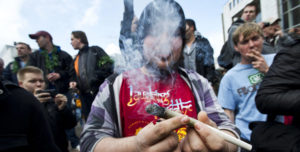Even before he became Israel’s prime minister, Binyamin “Bibi” Netanyahu, at the age of 43, was already being called “yesterday’s man” by the Israeli media. Just five months after being elected leader of Likud, Israel’s main Right-wing party, interviewers were asking him to his face: “Are you a political failure?”
It was August 1993 and the Labour government led by Yitzhak Rabin had just signed a peace agreement with Yasser Arafat’s Palestine Liberation Organisation, promising a fresh outlook and a “new Middle East”. Netanyahu, with his grim predictions of bloodshed and Israel’s gradual destruction by the Palestinians’ “salami tactics”, barely made it into the backpages.
But as the Oslo Process descended into chaos, with Palestinians carrying out suicide attacks in Israeli cities and a Jewish settler massacring Muslims at prayer in Hebron, Netanyahu gradually regained his footing in the polls. In November 1995, the assassination of Rabin by a Right-wing extremist caused his popularity to plunge again, as many blamed him for inciting violence. Lagging 25 points behind Labour, many in Likud favoured replacing him as leader, but Netanyahu quashed any opposition. He flew to America, hired a Republican attack-dog strategist, and fought a ferocious campaign depicting himself as the man to bring “a secure peace”. He deployed thousands of volunteers in the streets with signs reading “Netanyahu is good for the Jews”. In six months, he turned his fortunes around, and in May 1996 beat Rabin’s successor with a sliver of the vote.
Netanyahu, Israel’s longest-serving prime minister, is invariably described as a political winner. But he has suffered plenty of defeats. He lost power after his disastrous first term in 1999. Then in 2003, he was beaten in the Likud leadership election by Ariel Sharon, whom he had mistakenly taken for an aged caretaker who would easily be swept aside. When he finally regained the leadership in 2006, Likud suffered its worst result in half a century. What marks him as a politician is not his string of victories, but his enduring ability to come back and bury his opponents after everyone has counted him out.
After four decades in public life, at the age of 73, Netanyahu is on the brink of yet another comeback. Tomorrow, he will lead Likud for the 11th time in a parliamentary election, the last four of which ended in a virtual tie between the bloc of parties supporting him and those who refused to serve under a prime minister indicted for fraud and bribery. In June 2021, the opposition parties managed to come together in a bizarre coalition of nationalists, centrists, Left-wingers and conservative-Islamists, cobbled together by columnist and chat-show host Yair Lapid, which finally ejected Netanyahu from the prime minister’s office. But that coalition was never going to last. Sixteen months later, for the fourth time in his career, Netanyahu is once again the leader of the opposition taking on an incumbent: the architect of his most recent downfall, Prime Minister Lapid.
The polls have him just about breaking even, with the pro-Netanyahu bloc on 60 seats, one short of a majority in the 120-seat Knesset. But no one bets on the polls when it comes to Bibi. I began my career as a trainee reporter covering Netanyahu’s first run for prime minister in 1996 and have reported on every campaign of his since. Last week, I went to see one of his last rallies in Maale Adumim, a large suburb-settlement to the east of Jerusalem with 40,000 residents, where Likud won 48% of the vote last year. The turnout was disappointing: no more than 300 people, many of them children. Israelis, no matter where they lean politically, are tired of elections. Netanyahu isn’t.
In 26 years of campaigning, he hasn’t changed. He still strides masterfully across the stage, whipping up a cheering crowd. The carefully calibrated stump speech, its messages pre-tested with focus groups, still sounds like it just occurred to him on the spot. This has been a long campaign — officially four months since the Knesset was dissolved — but for him it began the moment the Bennett-Lapid government was sworn in on 13 June 2021 and another Knesset member had to tap him on the shoulder to remind him to vacate the Prime Minister’s seat on the Knesset floor. He will be the oldest member of the next Knesset but is still brimming with energy.
Any politician running for national office must be equipped with an over-sized ego and the self-belief that makes them think they can take decisions affecting the lives of millions. Netanyahu has an infinite supply of both. He is fueled by a sense of destiny, built up by being the son of a historian, the austere and dogmatic Professor Benzion Netanyahu, who saw the Jewish past, present and future as a never-ending struggle for survival in a bleak antisemitic world.
His opponents fight election campaigns. He is fighting every day of his life for the very existence of the Jewish people. His personal fate and that of the nation are one and he will never give up fighting, just like his father who continued his research almost until his death at 102. If he fails to win a majority tomorrow, he will try again. And again.
Such political irrepressibility is unrivalled by any contemporary politician, except perhaps Italy’s Silvio Berlusconi. Just like Bibi, “Il Cavaliere” (“The Knight”) has won, lost, and come back again despite those pesky Leftists prosecutors trying to pin corruption cases on him. In Netanyahu’s autobiography, there is a telling anecdote of a meeting between him and Berlusconi:
“So, Bibi,” he asked me, “how many television stations do you have?” “Israel has three stations,” I answered.
“No, I mean how many of them work for you?” asked Silvio, who owned Italy’s largest media empire.
“None,” I said. “Actually, all of them work against me.”
“So how can you win elections with both hands tied behind your back?” he asked, bewildered.
“The hard way,” I said.
Berlusconi entered politics at an older age, after accumulating a private fortune and building his own media empire. Not having what Netanyahu has called “my own media” still rankles him. He is convinced that were it not for Israel’s independent-minded press, he would never have lost a single election. After all, if Israelis had a clear view of him, they would have realised how essential his leadership is and how laughable any of his so-called rivals are. It is the media who is the real opposition and who egged on a weak Attorney General to press charges against him. Central to those charges is the claim that he used his position to bribe media owners to change their coverage of him. And central to his defence is the insistence that he was merely trying to level the playing field.
Netanyahu knows what Berlusconi and Donald Trump also understand instinctively. To triumph against the odds and then prepare the way for constant comebacks, winning elections is not enough. You must rebuild the political, social and media landscape in your image. The first stage must be a total revamp of your own party. Netanyahu achieved that by pushing out all his Likud rivals and flooding the membership with fanatical loyalists. Similarly, Trump pushed the GOP to its worst nature while Berlusconi formed his own, tailor-made Forza Italia and People of Freedom parties. As we saw in Britain just last week, politicians like Boris Johnson who fail to remake their parties rarely manage to make comebacks.
At 86, Berlusconi is unlikely to ever make it back into office again, but if it were not for his restructuring of post-war Italian politics, Giorgia Meloni would not be prime minister today. Neither is Trump’s return in 2024 at all certain, but his angry and polarised American politics will remain. And if Netanyahu loses on tomorrow night, his opponent will still be governing a country deeply divided between those who cling to Bibi’s staunchly nationalistic identity of Jewish survivalism, and those who prefer a much vaguer sense of secular Israeli citizenship. Whatever the result, Israel will remain Netanyahu’s for years to come.
Disclaimer
Some of the posts we share are controversial and we do not necessarily agree with them in the whole extend. Sometimes we agree with the content or part of it but we do not agree with the narration or language. Nevertheless we find them somehow interesting, valuable and/or informative or we share them, because we strongly believe in freedom of speech, free press and journalism. We strongly encourage you to have a critical approach to all the content, do your own research and analysis to build your own opinion.
We would be glad to have your feedback.
Source: UnHerd Read the original article here: https://unherd.com/





